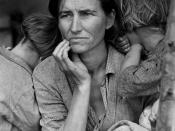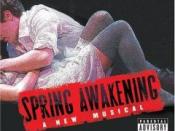Frank Wedekind's play Spring Awakening represents an adult's reflection on childhood, the repercussions of ignorance, and the consequence of inhibiting the spread of knowledge to those without it. Although very brief and lacking in extreme detail, this work has a profound aura; it leaves the reader with thoughts of how things could have resolved themselves better had key characters acted differently. It also gives a sense of the sanctity of youth and the dangers of growing up too fast. When we are forced to learn on our own, without the guidance of those who we desperately need it from, do we end up in irreversible positions that we never could have fathomed in the first place? This play gives definitive answers to all the questions surrounding the coming of age, the Spring Awakening.
Looking at childhood (namely adolescence), from both an outside perspective and inside, reveals just how differently children and adults view the world.
The children in this play see the world as full of discoveries that need to be made in order to grow up. In addition, they don't necessarily want to find out all these things on their own. The guidance of the adult figures, e.g. teachers and parents, is sorely missed by the children in the story. When trying to learn where children come from, the character Wendla naturally turns to her mother. Rather than even attempt to answer her daughter's question, Frau Bergman immediately succumbs to the awkwardness of the situation and delivers a short, circumventing monologue. It is an attempt to deter her daughter, not to enlighten her. It is apparent to the children that they cannot look to their parents for help, and so they must learn on their own.
The teachers in the story are no better. Upon the suicide...


